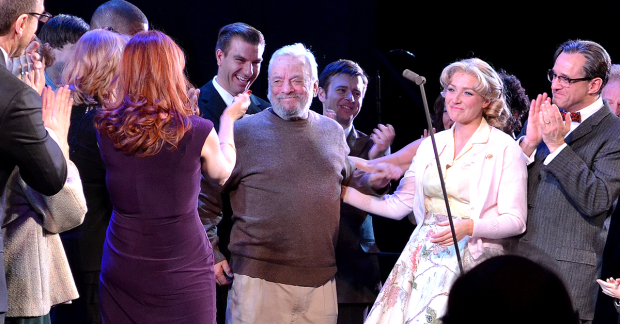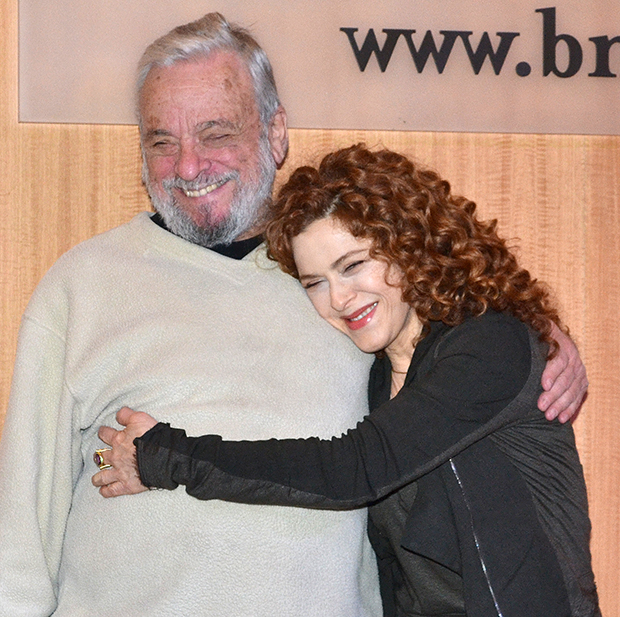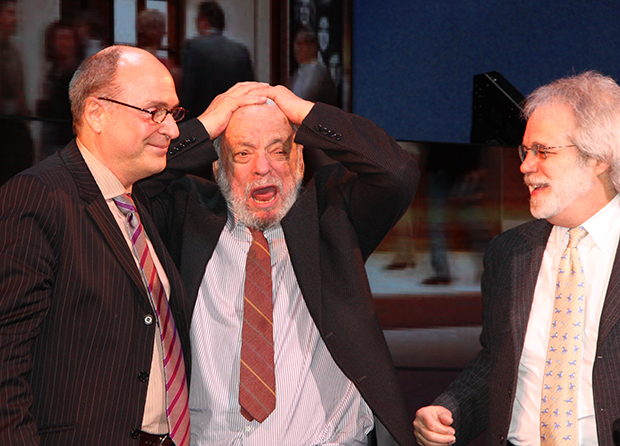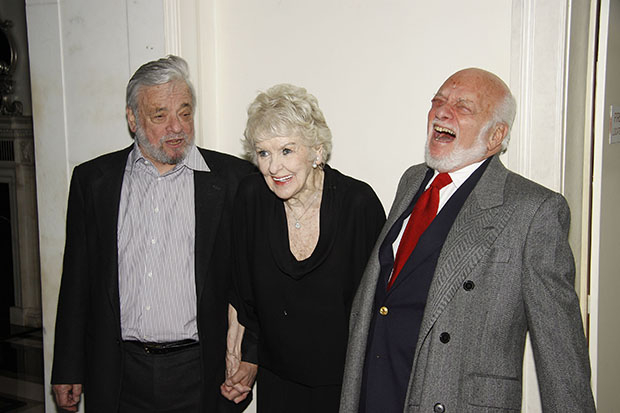Remembering Stephen Sondheim, the Man
Sondheim, dead at 91, lived long enough to see his own legacy form, for better or for worse.

(© David Gordon)
When Stephen Sondheim passed away, it seemed that sound waves themselves faltered in reverence. I was in the middle of listening to one of my favorite cast albums, pacing the hallway outside my office as I am wont to do. The memory is intimate, a quiet afternoon at home that could have passed into history with nary a note. I will now remember it in vivid detail for all time: the detached silence as the music cut out, only to be replaced by the shrill ring of a telephone; the way my vision narrowed, until all I could see was a small crack in the flooring; the inaudible, devastating catch in my throat when I tried to respond, and found myself incapable of producing anything more than a soft whimper. And then, the unending cacophony. Phones, ringing off the hook until eventually pulled from their jacks. Sobs, keening and guttural, as the terrible news was shared.
Stephen Joshua Sondheim, beloved artist, friend, and teacher, was gone.
At 91, he had lived a bountiful life, filled to the brim with enough emotion and experience to bring any one of us to our knees. Still, it was a tragedy. Sondheim was a man we had all, somehow, deluded ourselves into believing was immortal. I am a historian. I become intimately acquainted with those that are long dead on a daily basis. Yet it is a different, entirely shattering experience to witness a beloved collaborator transition from the present tense to the past tense, from contemporary colleague to cherished memory.

(© David Gordon)
Sondheim was a seismic force. His wit never faltered, nor did his sense of mischief. He had little patience for self-aggrandizement or lionized tributes — in fact, he rebuked flowery praise with the swift hand of a cynic. He was incredibly particular, and when he felt someone was venturing too close to the delicate, human vulnerabilities and sensitivities of his being, he would bite back, picking apart the language used by the invader. As the tributes rightfully pour in from all sides, he has been cemented as one of the towering effigies of the American theater, simultaneously eternal and unerringly of the moment.
In many ways, this breaks my heart. Every one of these tributes is deserved, and his impact cannot be overstated. My heart breaks, however, for Stephen, the human. Stephen, who found solace in stories and puzzles as a child, hiding away from a scornful mother. Stephen, who found love and support in the form of Oscar Hammerstein II, and who immediately began patterning himself after his newfound hero. Stephen, who always felt he was out of step, ever so slightly, with his surroundings. Stephen, who made a career slipping into the skin of those who felt excluded and erratic, misguided and misunderstood, out of line and out of order.
Sondheim fought against calcification for decades. As he walked among us, his mind nimble and curious as ever, he lived to see his own legacy form. To witness one's own creative yield cast in plaster is a fate I do not wish on anyone. He became the musical-theater colossus, worshipped with reverence as the human man stood to the side and observed. He began his career watching how others reacted to Hammerstein and ended his career watching how others reacted to him, on the outside of the unbalanced relationship maintained by much of his audience. They knew everything about him. He did his best to learn their name. How vulnerable it must be to be exposed in such a way to strangers.

(© Tristan Fuge)
He hated the word "relevant." Sondheim was incredibly particular about word choice — one had to always say exactly what they meant when speaking to him, or else they risked a tightened glance and a series of probing questions that would either decipher your meaning or your incompetence, depending on the topic at hand. To him, "relevant" was a nonsense word; if something existed, then it was rendered relevant by the very nature of its existence. Many have noted his work's ability to cut straight to the marrow of an experience; he could put into words that which felt isolating before flowing from his pen. His sense of humanity, and his ability to uncover the bloody, beating heart at the core of each of us is what caused his work to resonate with a listener in a haunting, and yes, relevant manner. Strike me down from the afterlife if you must Steve, but it is true.
This humanity, which flowed through him as a life force far more vivid than any vital fluid, could be witnessed in his generosity. He never forgot the lessons Hammerstein taught him, or where they came from. For the rest of his life, he endeavored to return that favor. Thousands of people, both in and out of the musical-theater industry, have stories of what Sondheim gave them. For some, it was a thoughtfully composed letter, gracious and grateful for the chance to establish some kind of a connection with the witnesses to his art. For others, it was a championing of their talents. He wrote many a recommendation letter, and connected many a hand to further the careers of those he believed in. He never appeared to fear being replaced or outmoded; in fact, he appeared to relish in witnessing work far outside the bounds of his own. He loved the musical and treasured all of the things it could be, even if some of those things were out of his reach. He was generous with his resources, generous with his connections, and overwhelmingly generous with his time.

(© Joseph Marzullo)
When I first spoke to him, I approached as though I was a devotee approaching the great Colossus of Rhodes, kneeling in deference to his wisdom. That, obviously, would not do. By the end of that first conversation, the very earth on which I stood had shifted as he had summarily dismantled the crystallized structure of expectation that surrounded him, revealing the stubborn, sparkling human being who insisted I look him in the eye. He refused to let me engage with him as anything less than an equal — to devalue myself before him was debasing. In one hour, he undid nearly two decades of trained genuflection, leaving me to reform myself invariably in his secure and strong-minded image, just as he had done when faced with Hammerstein 80 years prior. In his eyes, my words had weight and my ideas merit. He left me no option but to see that too. That is the core of who Stephen Sondheim was: a human being who believed in the value of every other human being who chose to engage with the ephemeral muse.
On Saturday night, barely 24 hours after his passing, I attended Assassins at Classic Stage Company. The ticket had been purchased months prior, a cathartic coincidence. As I sat in the theater, watching other patrons file in, a soft ringing entered my ears, warm and comforting. For this, truly, was the proper way to mourn him. To experience his marvelous music, alive and active, ever changing and ever evolving. The man may be gone, but the icon remains. It is our responsibility to not only keep his art alive, but to enliven the art of every other human being who endeavors to enter this artform. Sondheim worked tirelessly to embolden the humanity in every individual he came across, both through his work and through his own, personal actions.
It's our time now.








